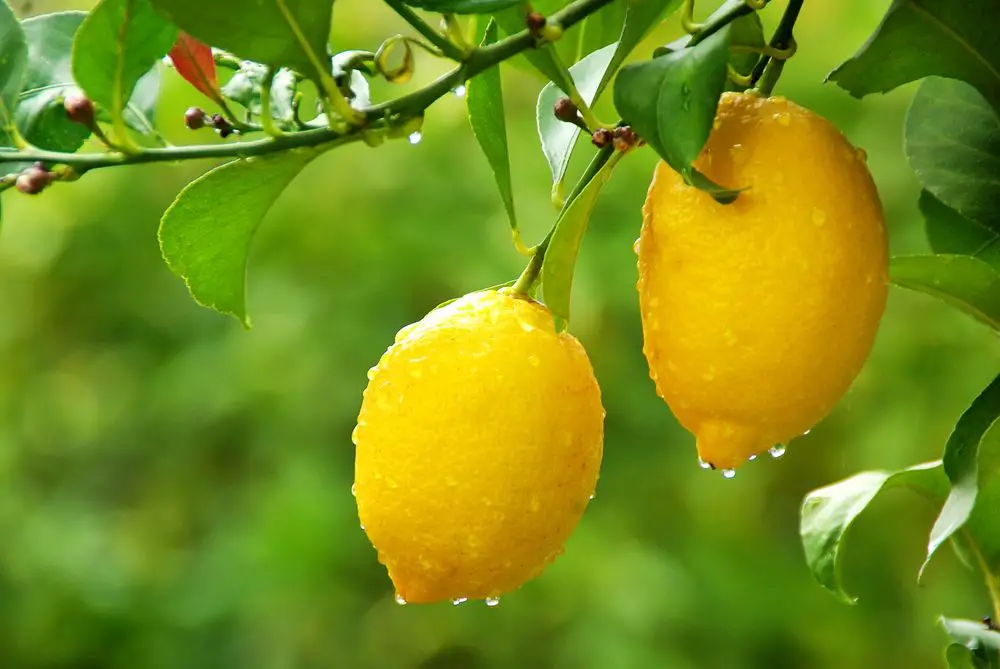Lemon trees are easy to grow. They can adapt to different soils and climates so that they can be grown in many different places.
How to Fertilize Lemon Trees: A Full Guide
Fertilizing lemon trees helps them grow well, keeps them from not getting enough nutrients, and makes them produce more fruit. Use a balanced citrus fertilizer twice a year, in the spring and summer, and make sure to water, prune, and keep an eye on your plants as well.
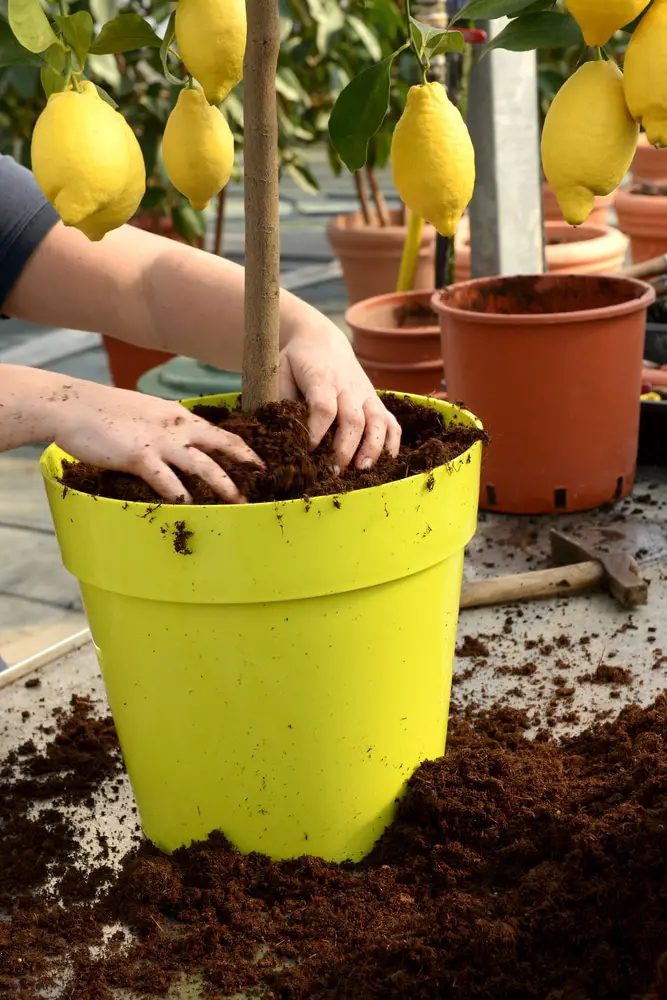
There are several reasons why lemon trees are so popular.
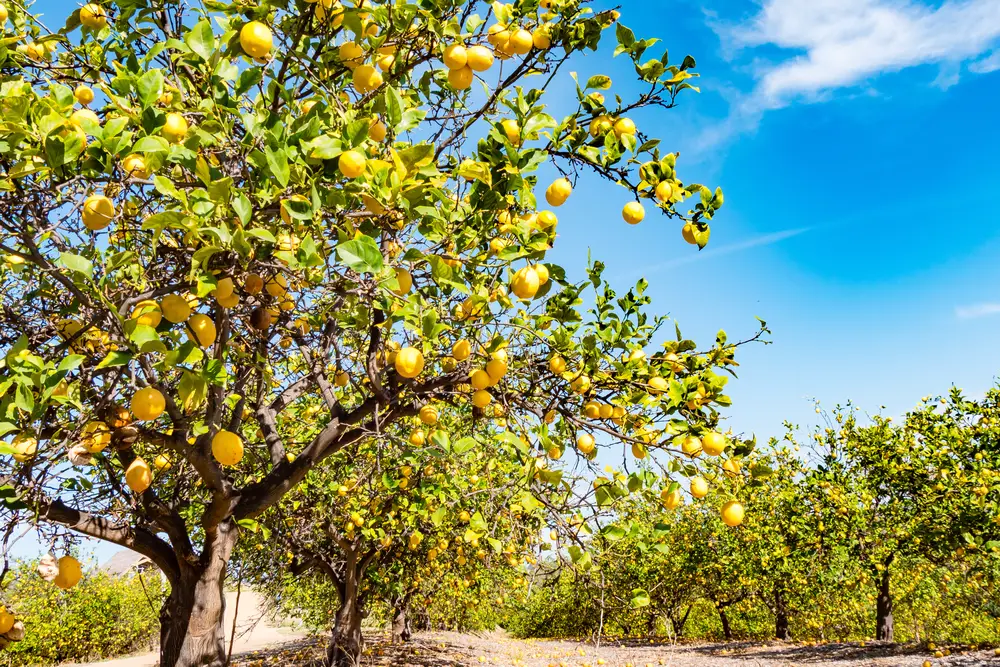
First of all, they are very easy to grow and tend to produce fruit quickly, even in places with difficult weather, like cooler climates.
Also, having a lemon tree in your yard is like bringing a little bit of the tropics to your own space.
Lemons are a must-have for any kitchen garden because they taste fresh and sour and can be used in many ways in cooking and baking.
Their juicy fruit can be used in a wide range of foods, drinks, and cleaning products. The smell of the tree and its flowers is a pleasant addition to any garden or indoor setting.
Lemon trees are a popular choice for home gardening and landscaping because they are easy to care for and look good. They can be grown in a pot or the ground.
To keep lemon trees healthy and full of lemons, it’s important to fertilize them right.
This article will tell you everything you need to know about how to fertilize lemon trees so they grow well and make lots of lemons.
What You Should Know About Lemon Trees
Lemon trees are popular with home gardeners and farmers because they produce tasty fruit and are easy to care for.
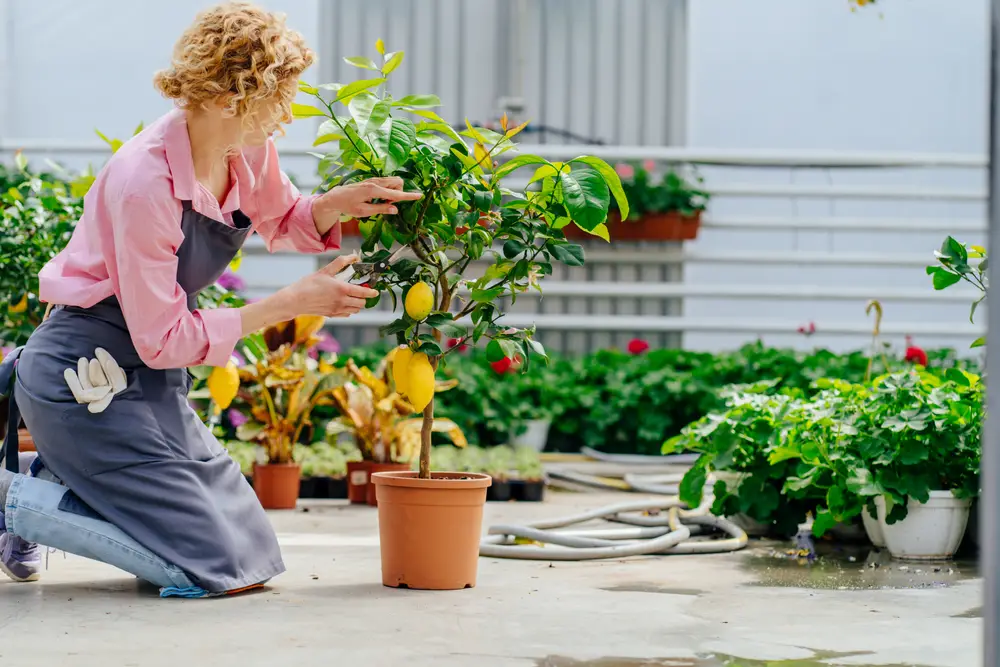
To grow lemon trees that are healthy and full of fruit on their branches, it’s essential to provide for them the right conditions.
First, lemon trees need soil that drains well and has a pH level between 6.0 and 7.0.
This kind of soil lets the tree’s roots grow and soak up water properly, which is vital for the tree’s health as a whole.
Lemon trees also need lots of sun and warm weather to grow well.
They don’t like cold weather and can be hurt by frost, so it’s best to grow them in areas where the winters are mild.
Lemon trees need more than just the right soil and climate for good growth and abundance of fruit. They also need the proper nutrients.
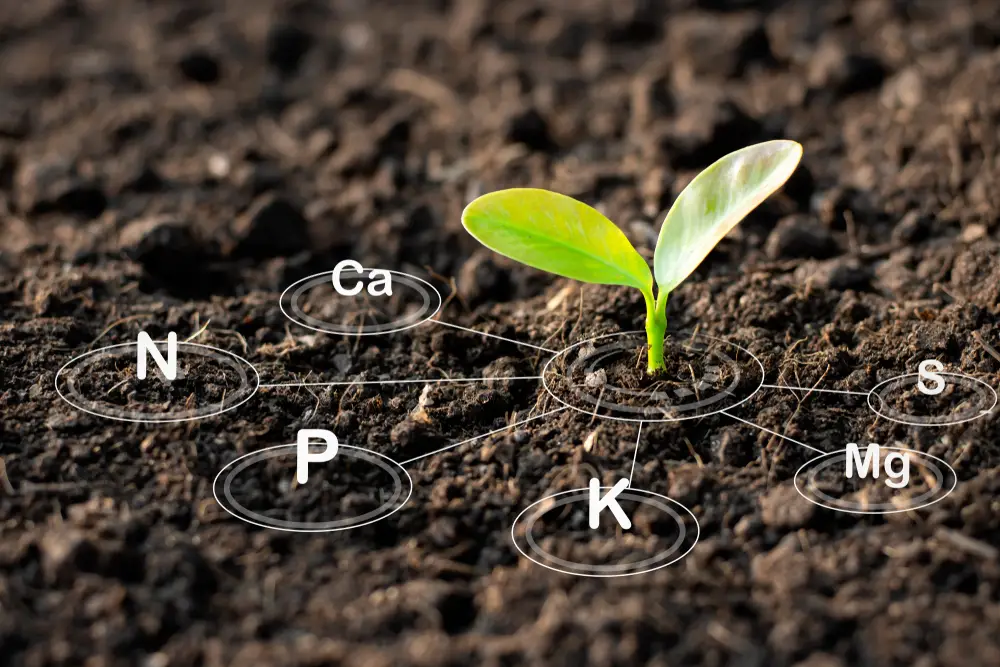
Nitrogen, phosphorus, and potassium are some of the most common nutrients that lemon trees don’t get enough of.
It’s important to fertilize your lemon tree regularly to ensure it gets enough of these things so it can grow healthy leaves, flowers, and fruit.
To sum up, to grow healthy lemon trees, you need to give them well-drained soil with a slightly acidic pH, a warm climate with lots of sunlight, and the proper nutrients through fertilization.
With the right care, you can enjoy the sweet, juicy taste of homegrown lemons for many years to come!
How and When to Feed Lemon Trees
Fertilizing lemon trees is a big part of taking care of them because it gives them the nutrients, they need to grow strong and make a lot of fruit.
Knowing when to fertilize your lemon tree for the best results is important.
Most of the time, you should fertilize lemon trees twice a year, once in the spring and once in the summer.
This schedule ensures that the tree gets the right nutrients at the right time so it can grow well and make fruit.
The fertilizer in the spring helps the tree grow new leaves, and the fertilizer in the summer gives it a boost as it starts to mature and bear fruit.
It’s important to remember that when fertilization happens can depend on a number of things.
The fertilization schedule can be affected by the type of soil, the age of the tree, and the weather in your area, so it’s best to talk to a local garden centre or plant nursery for advice that fits your area.
They can help you to plan when to fertilize based on what your lemon tree needs and how it is growing.
To sum up, for the best results, you should fertilize your lemon tree twice a year – once in the spring and once in the summer.
The right time to fertilize can depend on things like the type of soil, the age of the tree, and the weather in the area, so it’s important to get advice from a local expert.
By giving your lemon tree the proper nutrients at the right time, you can help it grow in a healthy way that will last for many years.
What to Use to Feed Plants – What Fertilizer to Use for Lemon Trees
It’s important to fertilize lemon trees to keep them healthy and productive, but choosing the right fertilizer for the job is also essential.
There Are Two Main Kinds of Fertilizers: Organic and Artificial.

Organic fertilizers, like compost, bone meal, and blood meal, are made from natural materials. They are excellent for gardeners who like to use natural, environmentally friendly products.
People who don’t want chemicals in their food or environment can also use organic fertilizers.
Chemicals are used to make synthetic fertilizers, on the other hand.
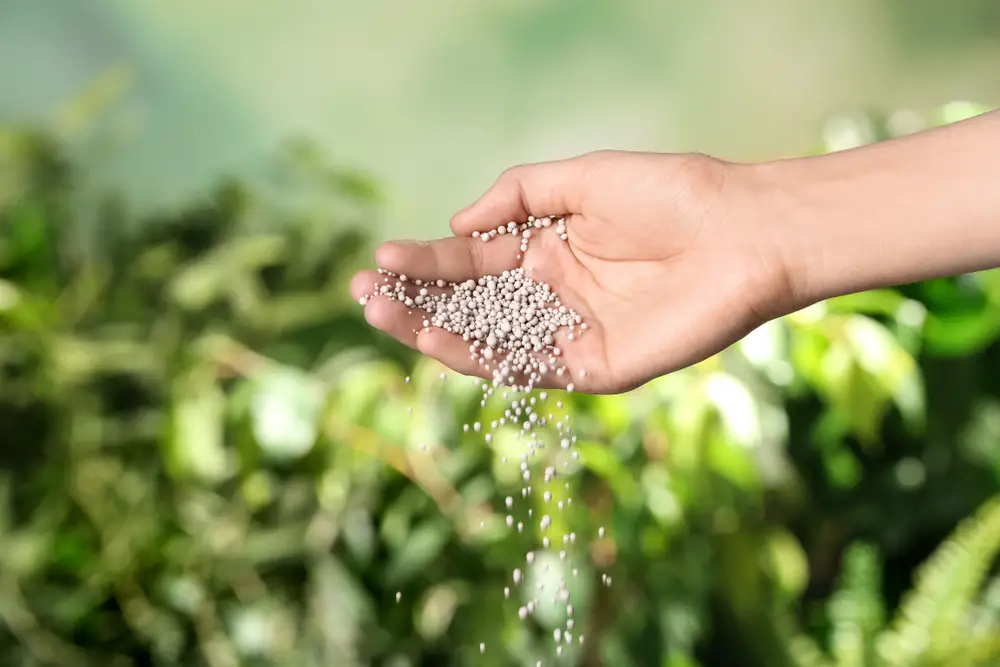
They are often more concentrated and a good way to get nutrients quickly and easily.
Synthetic fertilizers are a good choice for people who want their fertilizing to work more swiftly and consistently.
For lemon trees, you should use a balanced fertilizer with identical amounts of nitrogen, phosphorus, and potassium.
This kind of fertilizer will give the tree a wide range of nutrients that will help it grow and make fruit.
A fertilizer made especially for citrus trees is also a good choice because it has the right balance of nutrients that are especially important for this type of tree.
As such, you can choose between organic and synthetic fertilizers for your lemon tree.
For healthy growth and fruit production, it’s best to use a balanced fertilizer with equal amounts of nitrogen, phosphorus, and potassium or a fertilizer made just for citrus trees.
How to Give Lemon Trees Food
It’s important to fertilize lemon trees correctly if you want them to stay healthy and produce fruit.
Here Is How to Give Your Lemon Tree Fertilizer:
Choose the right fertilizer. Choose a fertilizer made especially for citrus trees or a balanced fertilizer with equal amounts of nitrogen, phosphorus, and potassium.
Find the right amount. Depending on the size of the tree, the amount of fertilizer you should use will be different. Talk to the product’s label or a gardening expert to find out how much your tree needs.
Apply the fertilizer. Spread the fertilizer evenly around the tree’s base, careful not to get it on its trunk. Make sure to spread the fertilizer out evenly so that no one part of the tree gets too much.
Water the tree. After you put fertilizer on the tree, you should water it well so that the nutrients can soak into the soil.
Follow the instructions from the manufacturer. In general, it’s best to follow the instructions from the manufacturer for how much to use and how often. This will help ensure your tree gets the right amount and timing of nutrients.
In conclusion, giving your lemon tree the right amount of the correct fertilizer is essential to keeping the tree healthy and productive. Spread the compost evenly around the base of the tree, water it well, and follow the manufacturer’s instructions for how often and how much to use.
Maintenance and Keeping an Eye on Your Lemon Tree
To stay healthy and produce beautiful lemons, lemon trees must be cared for and watched regularly.
Here’s what you should know about caring for and keeping an eye on your lemon tree:
Check the tree’s growth and the number of fruits it produces.
Regularly checking the tree’s development and the number of fruits it makes can help you find any nutrient deficiencies.
If you notice changes in how the tree grows or how much fruit it makes, you should get a soil test to see if there are any problems.
Proper watering: Lemon trees need a steady supply of water to take in the fertilizer’s nutrients and grow well. Make sure to water your tree often, but don’t water it too much or the roots could rot.
Pruning: Pruning can help the tree’s health in general and make it easier to feed it. You should prune your tree often to eliminate any dead, diseased, or broken branches and help new, healthy branches grow.
Pest control: Check your tree often for signs of disease and pests. Finding and treating problems early can help keep them from getting worse.
Fertilizing regularly: As we’ve already talked about, lemon trees need to be fertilized twice a year, in the spring and summer, with a balanced fertilizer made just for citrus trees.
In summary, it’s essential to care for and keep an eye on your attractive lemon tree to make sure it stays fruitful and in vigorous growth. Check on the tree’s growth and fruit production regularly, make sure it gets enough water, prune it regularly, keep an eye out for pests and diseases, and fertilize it twice a year with a balanced fertilizer.
By doing these things, you can ensure your lemon tree is nurtured and rewards you with crop after crop of fresh, juicy, lovely lemons. No wonder songs have been written about this tree!
Final Thoughts on How to Fertilize Lemon Trees: A Full Guide
Lemon trees that are well cared for are a wonderful sight with their dark green leaves and luscious yellow fruits – even the flowering stage is an attractive sight with hundreds of small white flowers adorning the length of the branches.
Clearly a well-earned reward for the attentive gardener!
Best yet, by following a few simple steps, gardeners can provide their lemon trees everything they need to grow strong, healthy, and fruitful; year after year and well into the future!
Read More:
11 Weeds That Look Like Grass (Invasive Grass Types)

